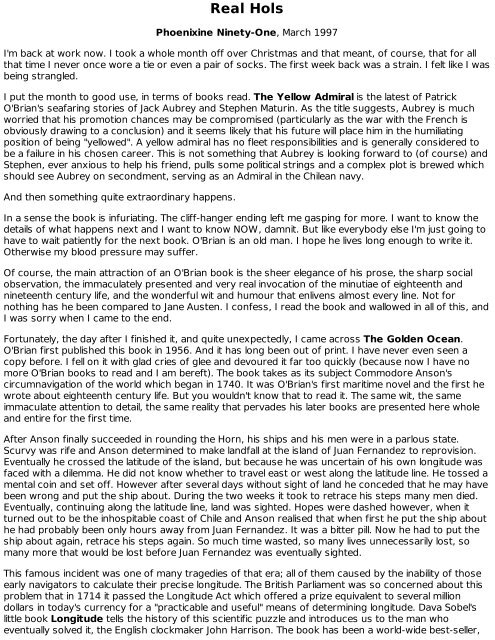Triffids Beard 2 - The Bearded Triffid
Triffids Beard 2 - The Bearded Triffid
Triffids Beard 2 - The Bearded Triffid
Create successful ePaper yourself
Turn your PDF publications into a flip-book with our unique Google optimized e-Paper software.
Real Hols<br />
Phoenixine Ninety-One, March 1997<br />
I'm back at work now. I took a whole month off over Christmas and that meant, of course, that for all<br />
that time I never once wore a tie or even a pair of socks. <strong>The</strong> first week back was a strain. I felt like I was<br />
being strangled.<br />
I put the month to good use, in terms of books read. <strong>The</strong> Yellow Admiral is the latest of Patrick<br />
O'Brian's seafaring stories of Jack Aubrey and Stephen Maturin. As the title suggests, Aubrey is much<br />
worried that his promotion chances may be compromised (particularly as the war with the French is<br />
obviously drawing to a conclusion) and it seems likely that his future will place him in the humiliating<br />
position of being "yellowed". A yellow admiral has no fleet responsibilities and is generally considered to<br />
be a failure in his chosen career. This is not something that Aubrey is looking forward to (of course) and<br />
Stephen, ever anxious to help his friend, pulls some political strings and a complex plot is brewed which<br />
should see Aubrey on secondment, serving as an Admiral in the Chilean navy.<br />
And then something quite extraordinary happens.<br />
In a sense the book is infuriating. <strong>The</strong> cliff-hanger ending left me gasping for more. I want to know the<br />
details of what happens next and I want to know NOW, damnit. But like everybody else I'm just going to<br />
have to wait patiently for the next book. O'Brian is an old man. I hope he lives long enough to write it.<br />
Otherwise my blood pressure may suffer.<br />
Of course, the main attraction of an O'Brian book is the sheer elegance of his prose, the sharp social<br />
observation, the immaculately presented and very real invocation of the minutiae of eighteenth and<br />
nineteenth century life, and the wonderful wit and humour that enlivens almost every line. Not for<br />
nothing has he been compared to Jane Austen. I confess, I read the book and wallowed in all of this, and<br />
I was sorry when I came to the end.<br />
Fortunately, the day after I finished it, and quite unexpectedly, I came across <strong>The</strong> Golden Ocean.<br />
O'Brian first published this book in 1956. And it has long been out of print. I have never even seen a<br />
copy before. I fell on it with glad cries of glee and devoured it far too quickly (because now I have no<br />
more O'Brian books to read and I am bereft). <strong>The</strong> book takes as its subject Commodore Anson's<br />
circumnavigation of the world which began in 1740. It was O'Brian's first maritime novel and the first he<br />
wrote about eighteenth century life. But you wouldn't know that to read it. <strong>The</strong> same wit, the same<br />
immaculate attention to detail, the same reality that pervades his later books are presented here whole<br />
and entire for the first time.<br />
After Anson finally succeeded in rounding the Horn, his ships and his men were in a parlous state.<br />
Scurvy was rife and Anson determined to make landfall at the island of Juan Fernandez to reprovision.<br />
Eventually he crossed the latitude of the island, but because he was uncertain of his own longitude was<br />
faced with a dilemma. He did not know whether to travel east or west along the latitude line. He tossed a<br />
mental coin and set off. However after several days without sight of land he conceded that he may have<br />
been wrong and put the ship about. During the two weeks it took to retrace his steps many men died.<br />
Eventually, continuing along the latitude line, land was sighted. Hopes were dashed however, when it<br />
turned out to be the inhospitable coast of Chile and Anson realised that when first he put the ship about<br />
he had probably been only hours away from Juan Fernandez. It was a bitter pill. Now he had to put the<br />
ship about again, retrace his steps again. So much time wasted, so many lives unnecessarily lost, so<br />
many more that would be lost before Juan Fernandez was eventually sighted.<br />
This famous incident was one of many tragedies of that era; all of them caused by the inability of those<br />
early navigators to calculate their precise longitude. <strong>The</strong> British Parliament was so concerned about this<br />
problem that in 1714 it passed the Longitude Act which offered a prize equivalent to several million<br />
dollars in today's currency for a "practicable and useful" means of determining longitude. Dava Sobel's<br />
little book Longitude tells the history of this scientific puzzle and introduces us to the man who<br />
eventually solved it, the English clockmaker John Harrison. <strong>The</strong> book has been a world-wide best-seller,


